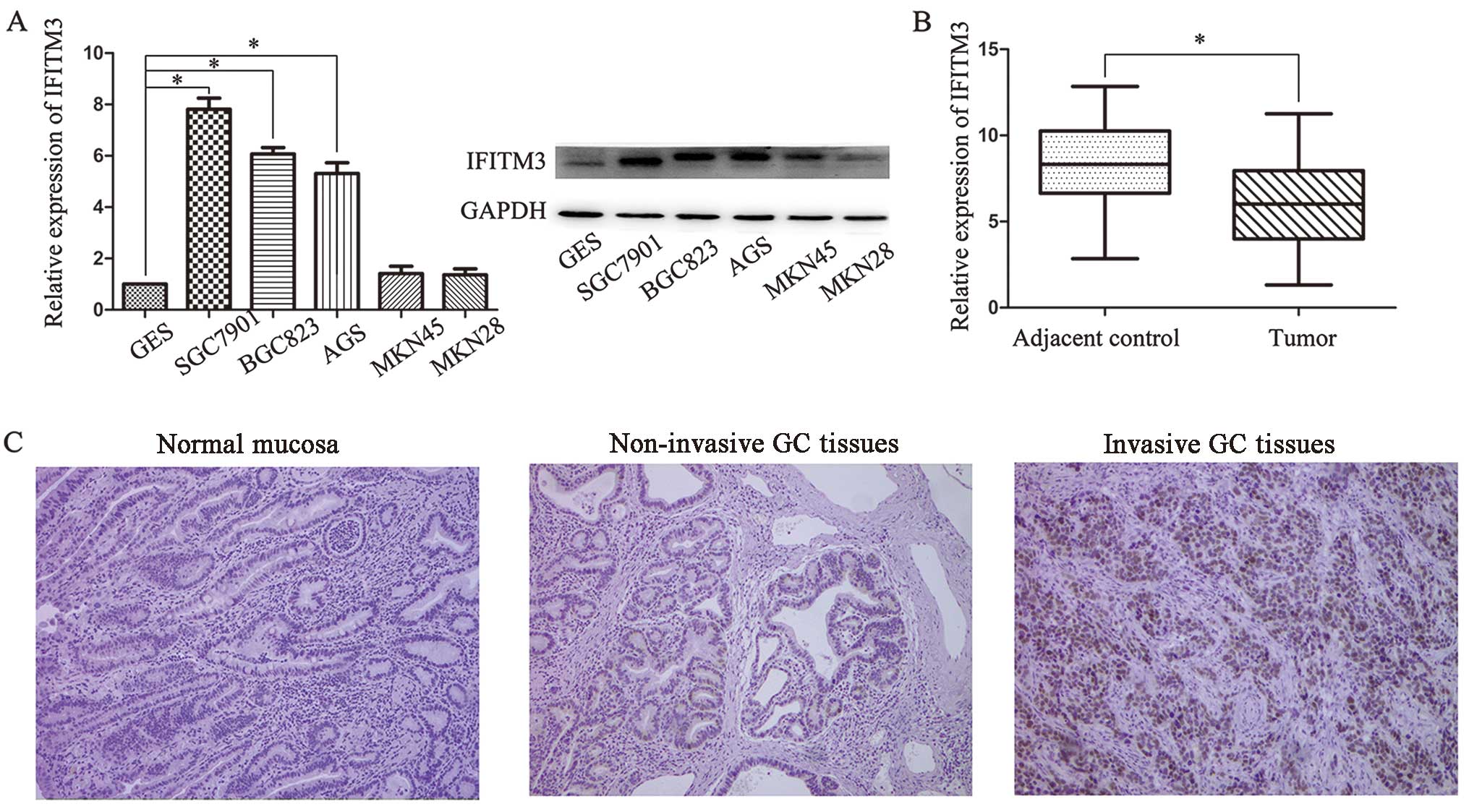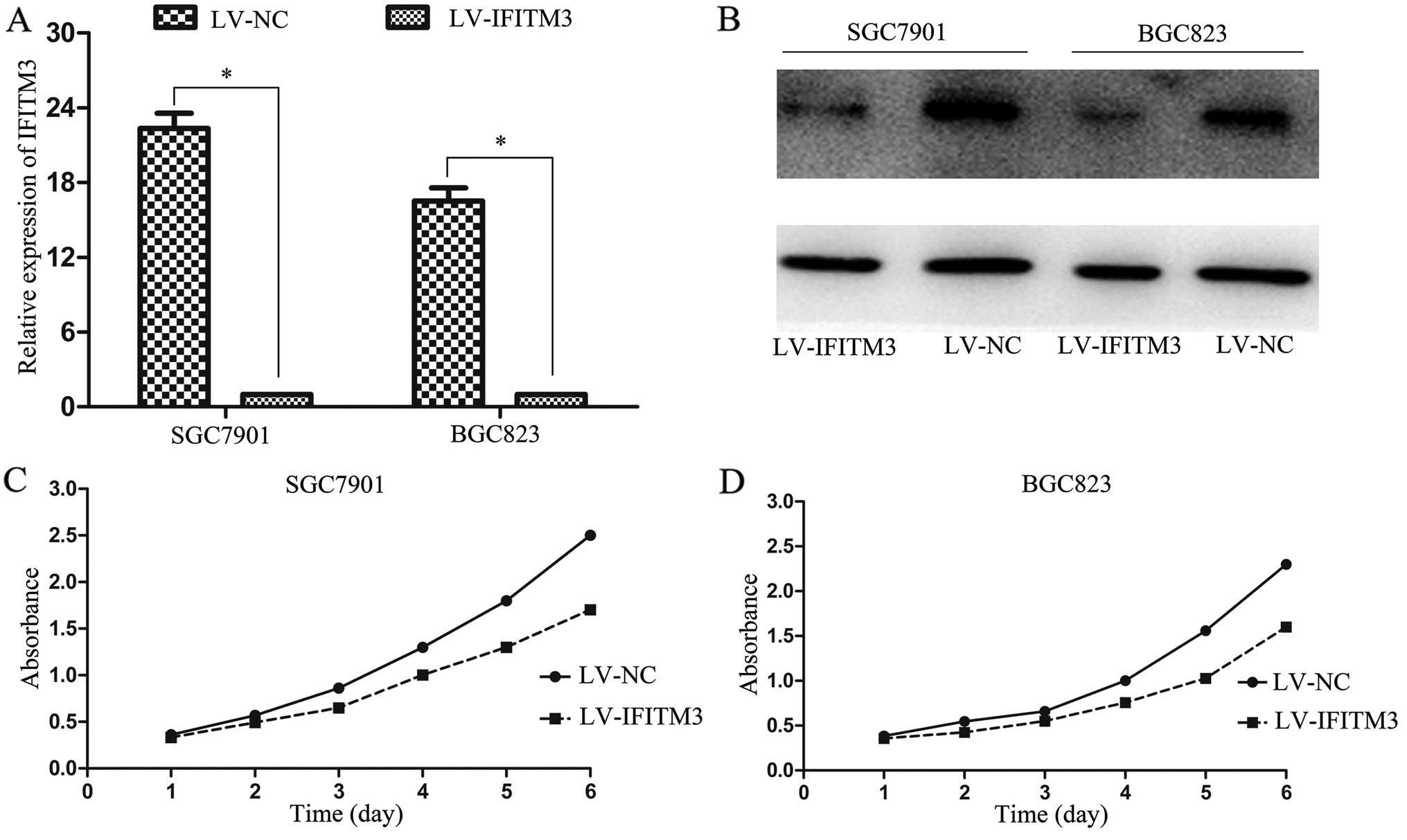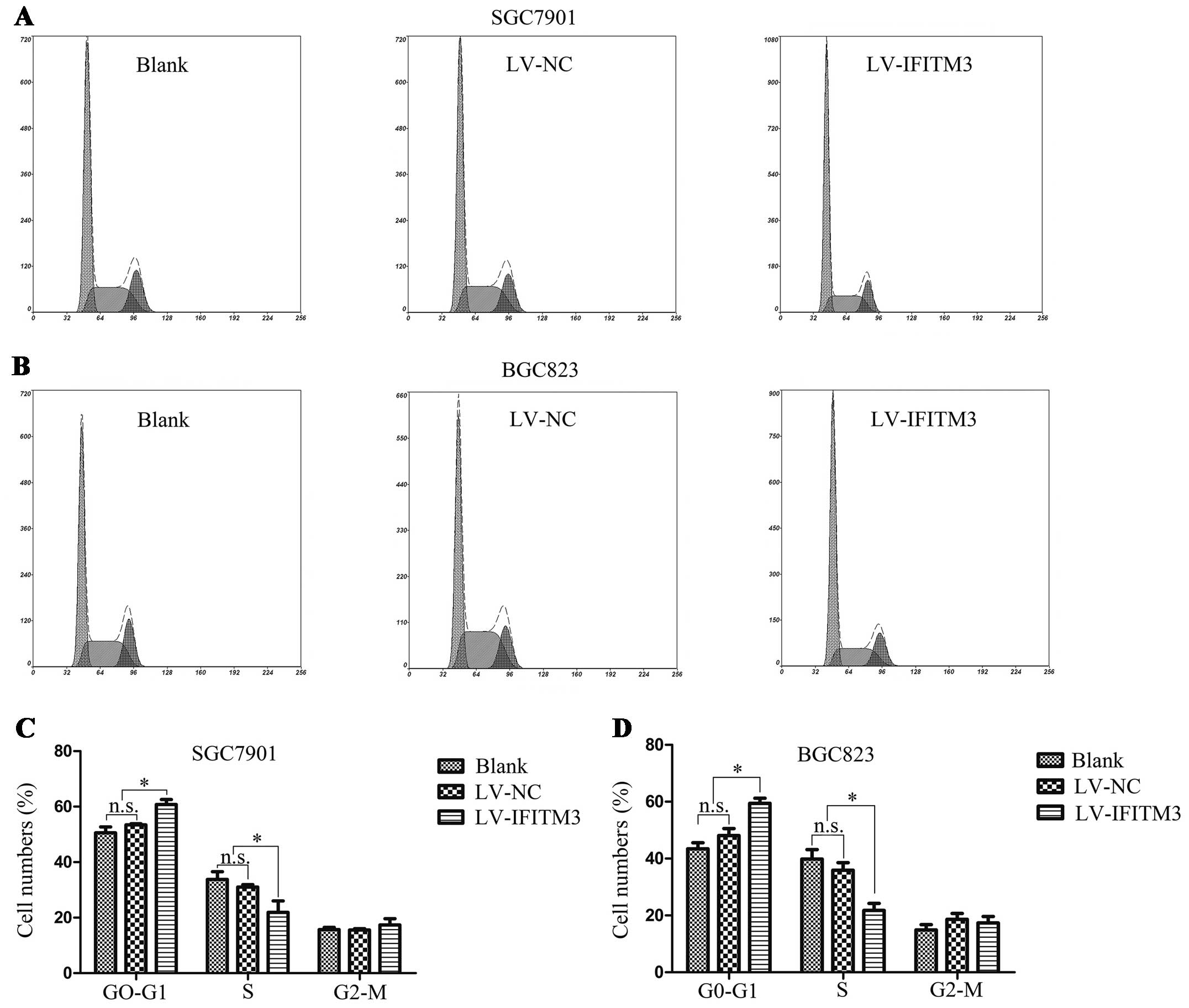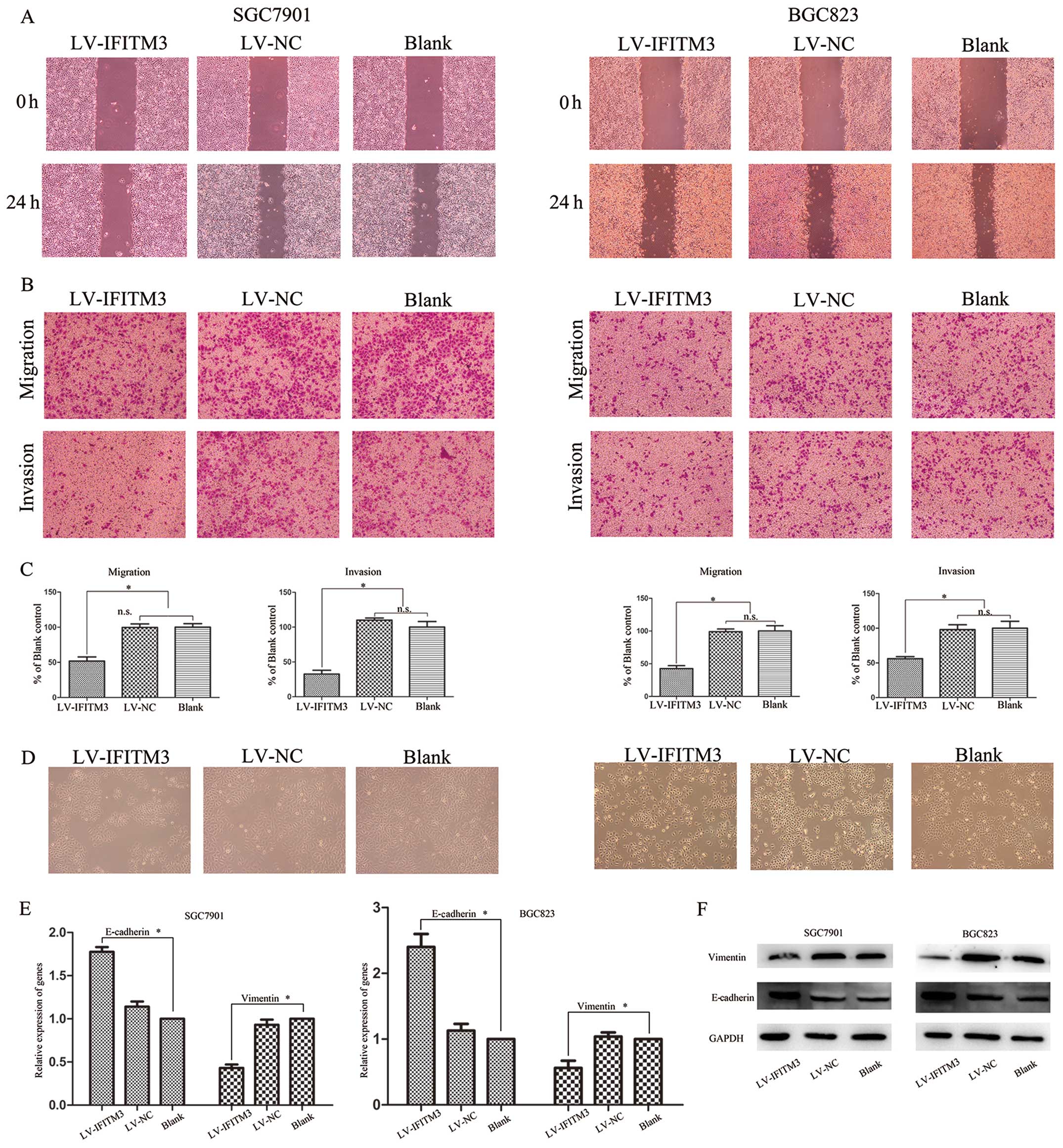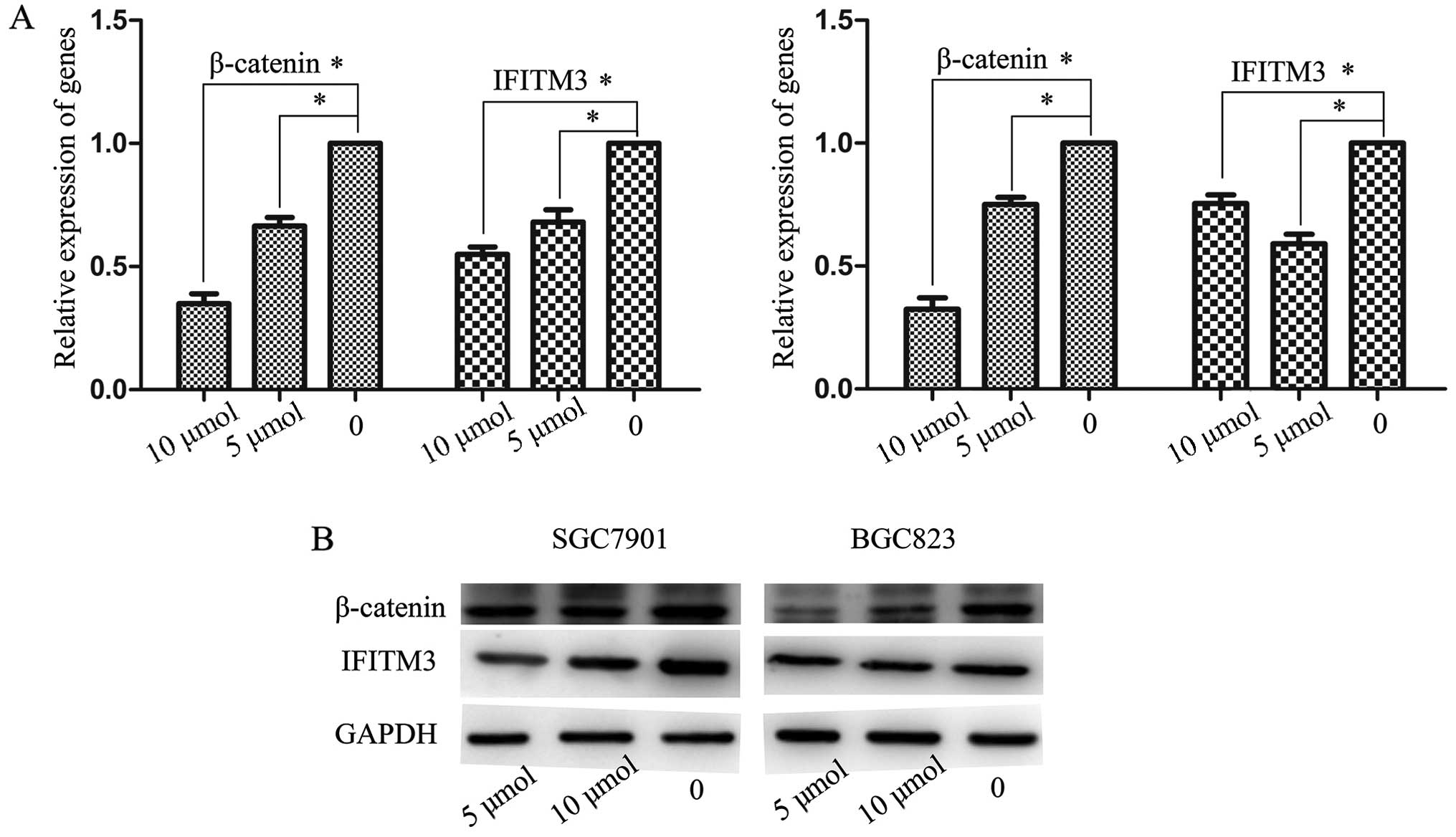|
1
|
Bertuccio P, Chatenoud L, Levi F, et al:
Recent patterns in gastric cancer: a global overview. Int J Cancer.
125:666–673. 2009. View Article : Google Scholar : PubMed/NCBI
|
|
2
|
Jemal A, Bray F, Center MM, Ferlay J, Ward
E and Forman D: Global cancer statistics. CA Cancer J Clin.
61:69–90. 2011. View Article : Google Scholar
|
|
3
|
Cheng Y, Jin Z, Agarwal R, et al: LARP7 is
a potential tumor suppressor gene in gastric cancer. Lab Invest.
92:1013–1019. 2012. View Article : Google Scholar : PubMed/NCBI
|
|
4
|
Khosravi Shahi P, Díaz Muñoz de la Espada
VM, García Alfonso P, et al: Management of gastric adenocarcinoma.
Clin Transl Oncol. 9:438–442. 2007.
|
|
5
|
Saitou M, Payer B, Lange UC, Erhardt S,
Barton SC and Surani MA: Specification of germ cell fate in mice.
Philos Trans R Soc Lond B Biol Sci. 358:1363–1370. 2003. View Article : Google Scholar : PubMed/NCBI
|
|
6
|
Lange UC, Saitou M, Western PS, Barton SC
and Surani MA: The fragilis interferon-inducible gene family of
transmembrane proteins is associated with germ cell specification
in mice. BMC Dev Biol. 3:12003. View Article : Google Scholar : PubMed/NCBI
|
|
7
|
Lewin AR, Reid LE, McMahon M, Stark GR and
Kerr IM: Molecular analysis of a human interferon-inducible gene
family. Eur J Biochem. 199:417–423. 1991. View Article : Google Scholar : PubMed/NCBI
|
|
8
|
Evans SS, Collea RP, Appenheimer MM and
Gollnick SO: Interferon-α induces the expression of the L-selectin
homing receptor in human B lymphoid cells. J Cell Biol.
123:1889–1898. 1993.
|
|
9
|
Tanaka SS, Yamaguchi YL, Tsoi B, Lickert H
and Tam PP: IFITM/Mil/fragilis family proteins IFITM1 and IFITM3
play distinct roles in mouse primordial germ cell homing and
repulsion. Dev Cell. 9:745–756. 2005. View Article : Google Scholar : PubMed/NCBI
|
|
10
|
Friedman RL, Manly SP, McMahon M, Kerr IM
and Stark GR: Transcriptional and posttranscriptional regulation of
interferon-induced gene expression in human cells. Cell.
38:745–755. 1984. View Article : Google Scholar : PubMed/NCBI
|
|
11
|
Tanaka SS, Nagamatsu G, Tokitake Y, Kasa
M, Tam PP and Matsui Y: Regulation of expression of mouse
interferon-induced transmembrane protein like gene-3, Ifitm3
(mil-1, fragilis), in germ cells. Dev Dyn.
230:651–659. 2004. View Article : Google Scholar : PubMed/NCBI
|
|
12
|
Smith RA, Young J, Weis JJ and Weis JH:
Expression of the mouse fragilis gene products in immune cells and
association with receptor signaling complexes. Genes Immun.
7:113–121. 2006. View Article : Google Scholar : PubMed/NCBI
|
|
13
|
Saitou M, Barton SC and Surani MA: A
molecular programme for the specification of germ cell fate in
mice. Nature. 418:293–300. 2002. View Article : Google Scholar : PubMed/NCBI
|
|
14
|
Nibbe RK, Markowitz S, Myeroff L, Ewing R
and Chance MR: Discovery and scoring of protein interaction
subnetworks discriminative of late stage human colon cancer. Mol
Cell Proteomics. 8:827–845. 2009. View Article : Google Scholar
|
|
15
|
Seyfried NT, Huysentruyt LC, Atwood JA
III, Xia Q, Seyfried TN and Orlando R: Up-regulation of NG2
proteoglycan and interferon-induced transmembrane proteins 1 and 3
in mouse astrocytoma: a membrane proteomics approach. Cancer Lett.
263:243–252. 2008. View Article : Google Scholar : PubMed/NCBI
|
|
16
|
Wylie C: IFITM1-mediated cell repulsion
controls the initial steps of germ cell migration in the mouse. Dev
Cell. 9:723–724. 2005. View Article : Google Scholar : PubMed/NCBI
|
|
17
|
Hatano H, Kudo Y, Ogawa I, et al:
IFN-induced transmembrane protein 1 promotes invasion at early
stage of head and neck cancer progression. Clin Cancer Res.
14:6097–6105. 2008. View Article : Google Scholar : PubMed/NCBI
|
|
18
|
Daniel-Carmi V, Makovitzki-Avraham E,
Reuven EM, et al: The human 1-8D gene (IFITM2) is a
novel p53 independent proapoptotic gene. Int J Cancer.
125:2810–2819. 2009.
|
|
19
|
Li J, Yang B, Zhou Q, et al: Autophagy
promotes hepatocellular carcinoma cell invasion through activation
of epithelial-mesenchymal transition. Carcinogenesis. 34:1343–1351.
2013. View Article : Google Scholar : PubMed/NCBI
|
|
20
|
Ledford H: Cancer theory faces doubts.
Nature. 472:2732011. View
Article : Google Scholar : PubMed/NCBI
|
|
21
|
Gialeli C, Theocharis AD and Karamanos NK:
Roles of matrix metalloproteinases in cancer progression and their
pharmacological targeting. FEBS J. 278:16–27. 2011. View Article : Google Scholar : PubMed/NCBI
|
|
22
|
Roy R, Yang J and Moses MA: Matrix
metalloproteinases as novel biomarkers and potential therapeutic
targets in human cancer. J Clin Oncol. 27:5287–5297. 2009.
View Article : Google Scholar : PubMed/NCBI
|
|
23
|
Andreu P, Colnot S, Godard C, et al:
Identification of the IFITM family as a new molecular marker
in human colorectal tumors. Cancer Res. 66:1949–1955. 2006.
|
|
24
|
Tian XH, Hou WJ, Fang Y, et al: XAV939, a
tankyrase 1 inhibitor, promotes cell apoptosis in neuroblastoma
cell lines by inhibiting Wnt/β-catenin signaling pathway. J Exp
Clin Cancer Res. 32:1002013.PubMed/NCBI
|
|
25
|
Zhao B, Wang H, Zong G and Li P: The role
of IFITM3 in the growth and migration of human glioma cells.
BMC Neurol. 13:2102013.
|
|
26
|
Li D, Peng Z, Tang H, et al: KLF4-mediated
negative regulation of IFITM3 expression plays a critical role in
colon cancer pathogenesis. Clin Cancer Res. 17:3558–3568. 2011.
View Article : Google Scholar : PubMed/NCBI
|
|
27
|
Yang M, Gao H, Chen P, Jia J and Wu S:
Knockdown of interferon-induced transmembrane protein 3 expression
suppresses breast cancer cell growth and colony formation and
affects the cell cycle. Oncol Rep. 30:171–178. 2013.PubMed/NCBI
|
|
28
|
Kelly JM, Gilbert CS, Stark GR and Kerr
IM: Differential regulation of interferon-induced mRNAs and c-myc
mRNA by α- and γ-interferons. Eur J Biochem. 153:367–371. 1985.
|
|
29
|
Jiang D, Weidner JM, Qing M, et al:
Identification of five interferon-induced cellular proteins that
inhibit West Nile virus and dengue virus infections. J Virol.
84:8332–8341. 2010. View Article : Google Scholar : PubMed/NCBI
|
|
30
|
El-Tanani MK, Jin D, Campbell FC and
Johnston PG: Interferon-induced transmembrane 3 binds osteopontin
in vitro: expressed in vivo IFITM3 reduced OPN expression.
Oncogene. 29:752–762. 2010. View Article : Google Scholar : PubMed/NCBI
|
|
31
|
Zhang YY, Chen B and Ding YQ:
Metastasis-associated factors facilitating the progression of
colorectal cancer. Asian Pac J Cancer Prev. 13:2437–2444. 2012.
View Article : Google Scholar : PubMed/NCBI
|
|
32
|
Scheel C, Eaton EN, Li SH, et al:
Paracrine and autocrine signals induce and maintain mesenchymal and
stem cell states in the breast. Cell. 145:926–940. 2011. View Article : Google Scholar
|
|
33
|
Zhao Y, Guo Q, Chen J, Hu J, Wang S and
Sun Y: Role of long non-coding RNA HULC in cell proliferation,
apoptosis and tumor metastasis of gastric cancer: A clinical and
in vitro investigation. Oncol Rep. 31:358–364.
2014.PubMed/NCBI
|
|
34
|
Egeblad M and Werb Z: New functions for
the matrix metalloproteinases in cancer progression. Nat Rev
Cancer. 2:161–174. 2002. View
Article : Google Scholar : PubMed/NCBI
|
|
35
|
Kabashima A, Maehara Y, Kakeji Y, Baba H,
Koga T and Sugimachi K: Clinicopathological features and
overexpression of matrix metalloproteinases in intramucosal gastric
carcinoma with lymph node metastasis. Clin Cancer Res. 6:3581–3584.
2000.PubMed/NCBI
|
|
36
|
Logan CY and Nusse R: The Wnt signaling
pathway in development and disease. Annu Rev Cell Dev Biol.
20:781–810. 2004. View Article : Google Scholar : PubMed/NCBI
|















